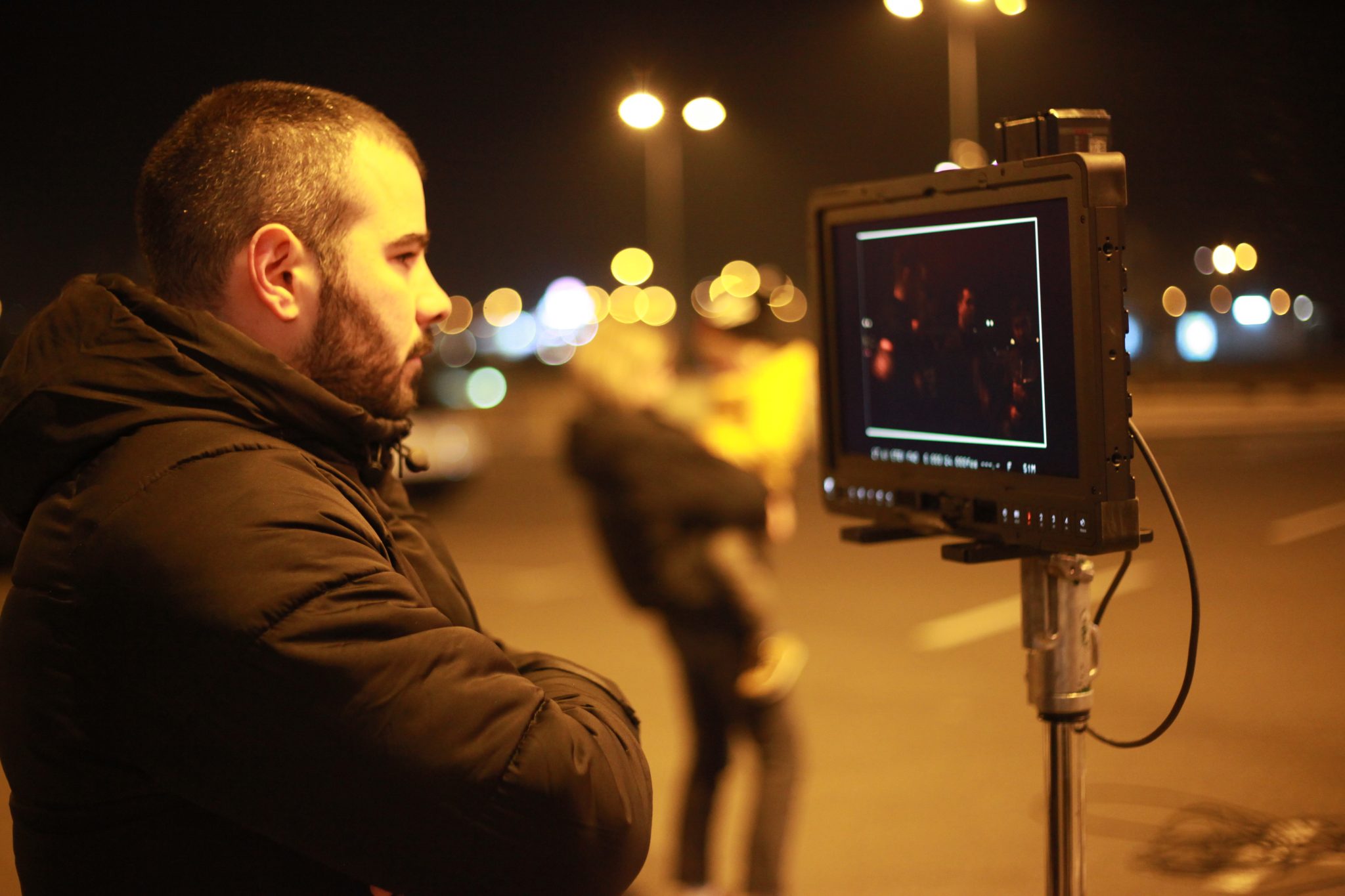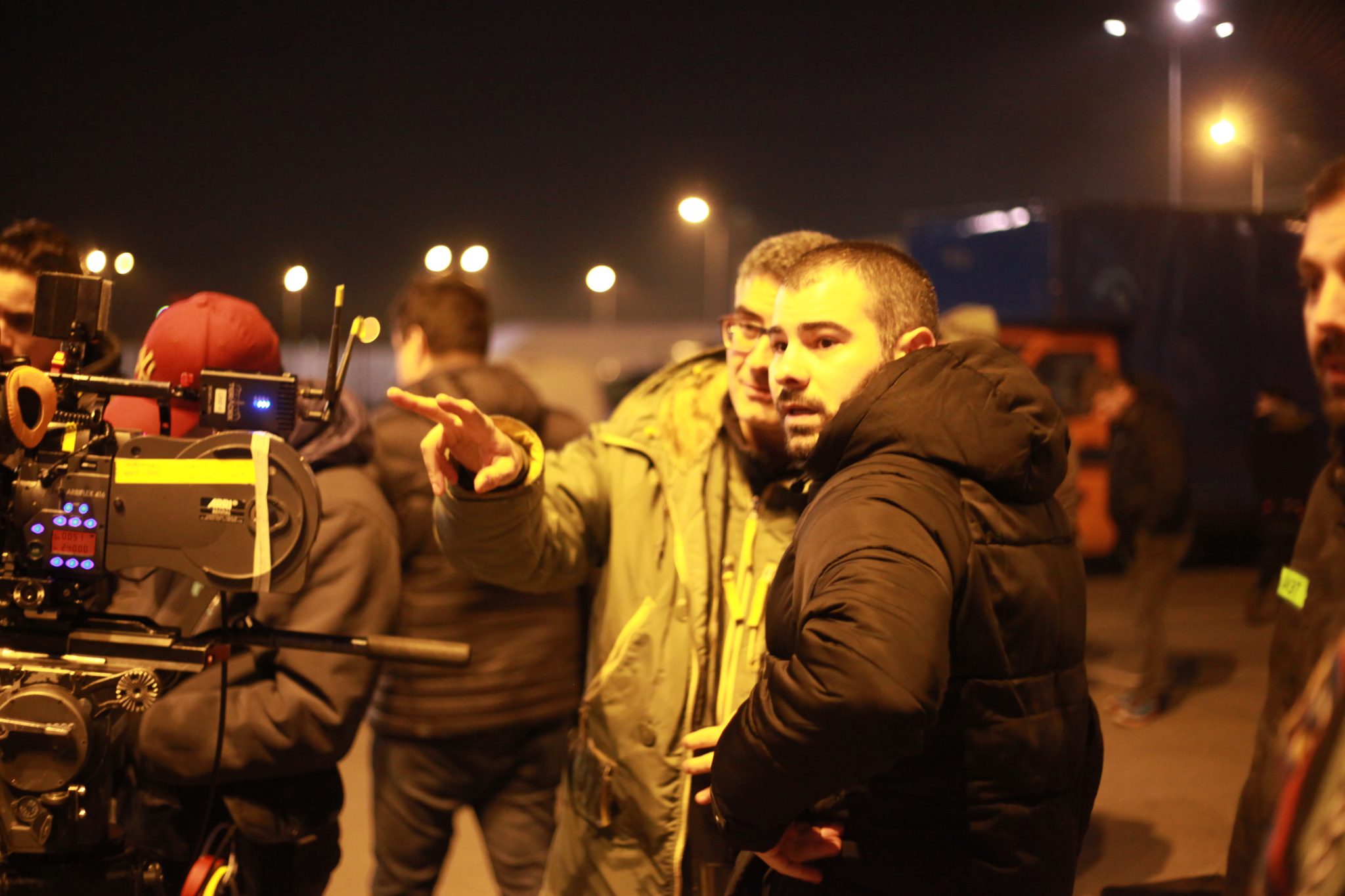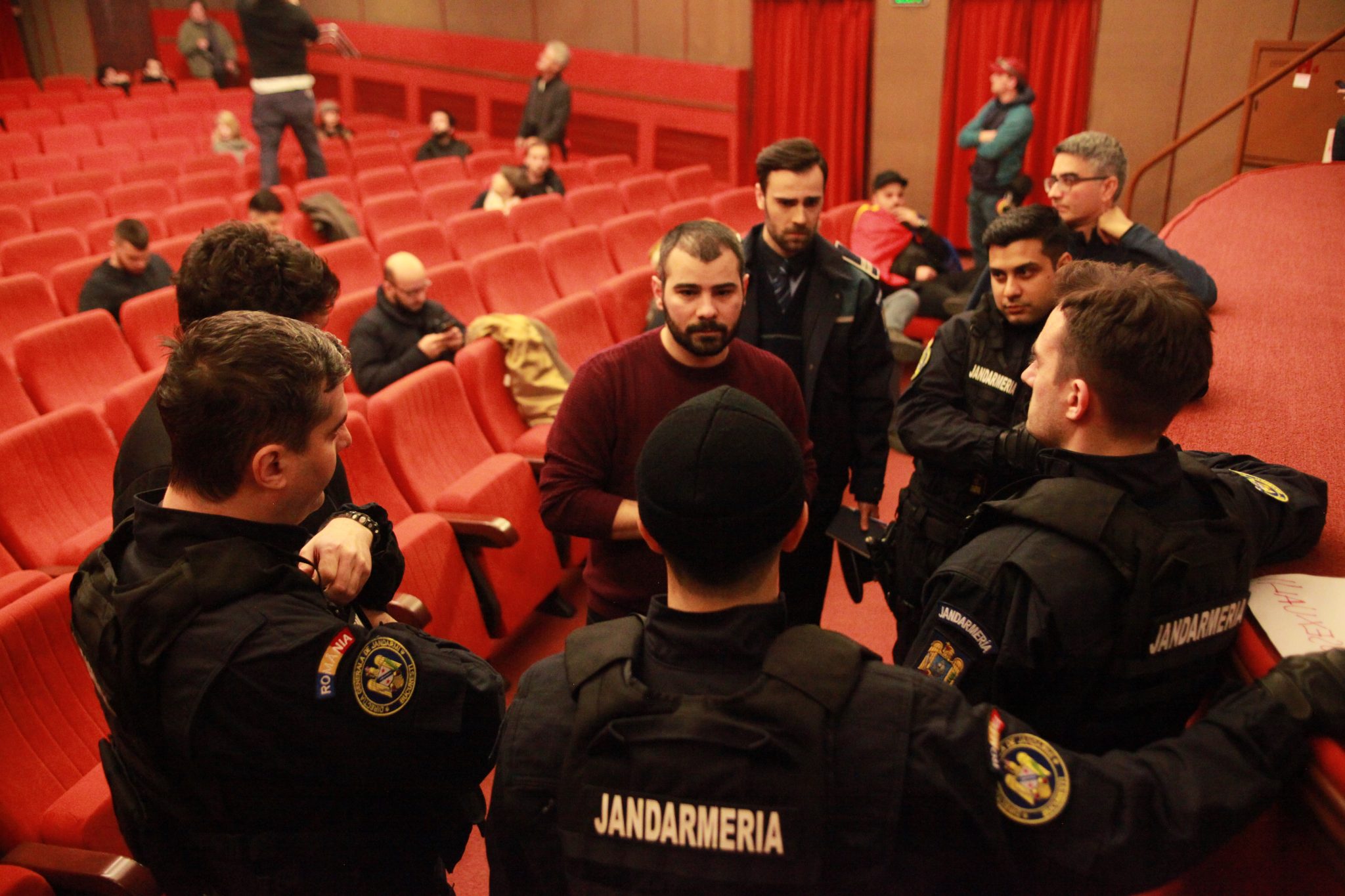Eugen Jebeleanu: “We need to shake the audiences up through stories they haven’t had access to before”
Known mostly as a theater director working in both Romania and France, Eugen Jebeleanu makes his debut in film directing with “Poppy Field” (2020), set to be released in theaters on September 17, after an important national and international festival run of almost a year.
After a screenplay by Ioana Moraru and inspired by a real incident that happened a few years ago at the Peasant Museum Cinema, the film presents a day in the life of Cristi (Conrad Mericoffer), a young gendarme from Bucharest. During a short visit from Hadi (Radouan Leflahi), his long-distance boyfriend, Cristi and his colleagues are called to intervene at a movie theater where a group of ultra-nationalist, homophobic protesters has sabotaged the screening of an LGBT film. In the midst of the scene, an old affair with another man resurfaces, threatening his professional and personal stability.
In an interview for Films in Frame, Eugen Jebeleanu opens up about several aspects revolving around the film such as his initial fears and doubts, the importance of the subject, his personal contribution to the story, the aesthetics of the film, his working process with the actors, his expectations on meeting the public and the newly acquired status of filmmaker.

At the film premiere you had at the Transilvania IFF, you said you had several fears and doubts about the script when it was proposed to you. What were they related to?
First of all, I didn’t know people in the film industry. I didn’t know how to gather a team. I’m not talking about the actors, I’m talking about the cinematographer, the editor, all the people behind the camera. But Velvet (i.e. Velvet Moraru, the producer of the film) assured me that I would have a great team, and so it was. Then, I had complete freedom to choose the cast, and that gave me confidence in what I could do with them as a director. Moreover, I brought Valica Panduru on the project, the set designer I work with in theater. I had no concerns about working with the actors. No more so than any theater projects I had worked on.
Instead, I was probably concerned about the technical aspect, how we were going to shoot the film. And it lasted for quite a while. Obviously, I started reading a lot of books and watching a lot of movies. But it was just theory. It was good though that we had a long period of preparation, almost four months, before the shooting started. I was able to put aside my fears, because Marius (i.e. Marius Panduru, the DoP) came to rehearsals and we talked a lot about what we were going to do. We found common references. I told him what I wanted from an aesthetic point of view, but also in terms of dynamic, dramaturgy of space, choreography, and he came with several options. Marius is probably the man who introduced me to filmmaking. Our collaboration went smoothly. I don’t know what he was thinking, but he never showed any doubts about what I was doing. Apart from that, I was very interested in the subject, I wasn’t afraid to explore it.
On the contrary, I wanted to do that. It seemed fair to me that this story should be told through film and not a theater play also because of this 24-hour concept and the fact that it’s rather a horizontal conflict, and not a huge, dramatic, theatrical tension.
You also said that you felt responsible to say something on the subject. What do you mean by this responsibility?
I felt that the film takes forward the artistic message we focused on in theater, where I talk mostly about the issues faced by the LGBT community. First of all, it’s the responsibility of accepting and developing this project, because it seemed like a response to what happened at the Peasant Museum Cinema in Bucharest. We need to keep making films on this topic and not let ourselves be overwhelmed by any form of intimidation and censorship that may come from some people. I wanted to keep my consistency as an artist who chose to talk about minority voices. That being said, I feel responsible to go all the way in this area as well.
I am part of the LGBT community and I have experienced the anguish, the turmoil, the discrimination that you face at school, within your family, and in all fields. I wanted to make it possible for these stories to be told through film, but not to exoticize, cosmeticize them, bring them to an area of social misery or cliché representation of what a gay character is.
Do you often meet this exoticized and cliché representation in cinema when it comes to such a character?
Unfortunately, yes. Maybe this representation would not bother me in a different context, but in a context like the one in Romania, I don’t know if it’s a good way to go. At the same time, it often comes as an exoticized topic because there is a present debate around it, more visible than before, and the sincere and honest gesture of talking about it, which comes from necessity, urgency, responsibility, fades against the curiosity to also explore this territory.
Did you also want your film to be a statement?
The statement is, first and foremost, the following: we have to keep on making such films. It’s about freedom of speech. That’s why I think Ioana wrote the script in the first place. She came with a hypothesis: let’s see how one of the gendarmes present at the incident would react, him being gay. How he would handle the inner conflict. Secondly, at a political level, it’s about the fight for rights and equality between LGBT people and the rest. There’s also some sort of manifesto in presenting a main character whose assumed homosexuality is not a marginal theme. It’s like saying we need this kind of fiction, too.
When we make theater or films out of public funds, I think we have an obligation to also talk about working-class people or people from the LGBT minority, because they have all contributed to these subsidies. We can’t just talk about heroic and heteronormative characters, who rather maintain a safety zone. It secures the spectator in his cultural and educational sphere and makes them feel protected. I think we need to shake the audiences up a bit and get them out of their comfort zone. How do we do that? By telling stories to which they haven’t had access before and presenting them in one’s own aesthetic form.

What did you use from your own experiences and feelings in creating this character and how did you discuss it with screenwriter Ioana Moraru and lead actor Conrad Mericoffer?
I bring parts of me on almost all projects I work on. I use myself as a starting point, but then I start stepping away from the story. I don’t want to stay in an autobiographical area, but in one inspired by our everyday lives, by who we are, by the questions we ask ourselves, by the concerns we have. In this particular story, I think my personal contribution rather flows into the inner state of the character. I’ve drawn from what it means to become aware that you are gay, and then to reconcile with it and fully assume it, or from what it means to be affected by your relationship with your family. To have a long-distance relationship. Hence the character of Radouan (i.e. Radouan Leflahi, who plays the protagonist’s boyfriend), who is French. I live this story with a Frenchman, even if now we’re not apart.
What it means to hide, to revise your body language, your gestures. Self-censorship actually has a ripple effect on the body, your way of being and acting, of showing yourself to the world. All these things leave traces and marks that are hard to remove. I realize now that when I was a teenager I was so concerned about not making it obvious that I became that man. I almost regret that I was influenced by a certain way of showing yourself in public, by a certain way of being, by a representation made according to some extremely macho codes, which entail showing other men your virility, and for them to actually validate how strong we males are. Therefore, I brought a lot of myself, from discussions, from feelings, from this disparity. At the same time, I was just as open to hearing other views, because there is no particular way to be gay. As many LGBT people as there are on this planet, there are just as many ways to see what it means to be an LGBT person.
Didn’t you and Ioana Moraru fear that by choosing a gendarme as the protagonist, you would go to an area that you don’t know very well professionally? Maybe it was best to make a film set in an artistic milieu. Weren’t you afraid that this contrast between such a manly environment and the character’s homosexuality might be a little too simple, too direct?
Yeah, we were. Ioana even said at one point that she was troubled by the fact that she couldn’t get inside the gendarmerie and know this world better, the way gendarmes think and act. At the same time, from my point of view, that was not the subject of the film. If we had told a story about the gendarmerie environment, and that was the concept or background, then we would probably have been poorly documented and it would have been a problem. From my perspective, the position he has is rather a pretext. It happens that the characters are gendarmes, but I don’t know how much that changes the way they relate to the theme. After all, we didn’t want to draw a distinction between the two sides – the upside is that he’s gay, the downside is that he’s a gendarme.
Still, we tried to include as much of the information we had about the gendarmerie as possible. We had a former gendarme, now a policeman, as a consultant, who guided us through their work procedures. That also helped the other actors who played the roles of gendarmes. I wasn’t very concerned about it, because I often deal with this in theater, with characters who have all kinds of jobs. Plus, I dread the idea of talking about theater in theater plays or about film in films. It seems self-sufficient to think only about ourselves. We need to talk about others as much as our humble understanding of things allows it.

You shot on 16mm and mostly in close-ups. How did you decide with DoP Marius Panduru what the film should look like?
Marius showed me and the production team different ways of filming, from digital to film stock, plus different formats. Then we had a discussion. Both I and Marius found it interesting to shoot on 16mm because it has that grain texture which, in close-ups, gives the impression that you can touch the character’s face, see his flaws, all the details of his face, and that he’s just a regular person like us all. We didn’t try to cosmeticize it in any way. The colors, the contrasts, the way in which the silhouettes and faces are outlined, it’s completely different from digital.
And we went with close-ups because it’s his portrait. Even when I work on a theater play, I think about the concept, the main action, and the point of view. From whose perspective do I tell the story? This film is told from Cristi’s perspective. It’s not shot from his subjective angle, but he is the person whose filter this narrative is told through. So we had to constantly be with him, like a witness, like his double, like a shadow following and listening to him very closely. I wanted to make it seem like it’s possible to touch him and suggest carnality, sensuality, as happens in the first part of the film. Then, to step away from him and watch him from afar, let him get lost in the crowd, but once he is alone again, to regain that closeness. I wanted that close proximity because, on the one hand, Conrad’s character is very quiet, and these silences had to be conveyed by image, and, on the other hand, this is what theater cannot do.
What is your process in working with actors? How did you collaborate with Conrad Mericoffer?
I want the actor to bring as much of their vulnerability, of what they are as individuals, of how they relate intimately and rationally to what they have to play, in order for their performance to be extremely authentic. To bring out their fragility, to reveal something that may be seen as risky, to put themselves on the line so that we can ask the audience to join the characters on this risky journey. That’s what I’m looking for in working with the actor. But not all the time.
Conrad is an extraordinary actor, so there’s no need to work with him on every little detail or on the logic of the text. It can happen with other actors though, when I feel that a question is not being asked properly or that there is simply no communication and no connection. Or when things don’t settle in. For me, working with the actor is essential. That’s why I’m a director. I tried to see what parts of Conrad Mericoffer can be found in this character, and not the other way around. How to bring the character to him and for them to become one. Whether or not he relates to this subject, I see all these fears and all this unrest in Conrad. I see mystery, tremor, turmoil, anxiety, but at the same time, dignity. I think he has a lot of nooks you can’t penetrate. That’s what I found interesting, in fact. He is just as honest in his speech as he is complex on the inside. That intrigued me because it gave me the chance to look at him through the eyes of a spectator who tries to discover him, to get to know him, to have access to all his thoughts and reactions, or to the way he conducts his gestures, his body.
We have never talked about the character solely in terms of his sexual orientation. His difficulty in leading a normal life comes mostly from the limits and barriers he sets for himself. That’s what I wanted to bring out. It’s clear from the first scene that he’s gay. I don’t have to explain and show the viewer at every step: Do you know he’s gay? I don’t have to take them for a fool. We wanted to be in the same position with the viewer, not to explain to them and to teach them, from our knowledge, how it is with homosexuality in Romania.

The film will come out in cinemas in just a few days. How do you see the encounter with the audience? Do you have any expectations in that sense?
First of all, I hope it will reach as many people as possible. And that it won’t just be the niche audience and the LGBT community that will come to watch it, because it’s not a film that is limited to this target audience. On the contrary, I would like to reach out to a public that may not be on the radar and may struggle with some doubts. And to all disadvantaged groups and social classes. I think it’s important when you do theater, film, social or political art, to focus not just on what it presents, but also on trying to reach a large audience. So, I hope that through the events we will organize with the production team and our partners we will reach a fairly diverse audience. But, I think that the most interesting screening will be the one on September 23 at the Peasant Museum Cinema, where the real incident took place.
How do you feel as a newcomer to the world of cinema and how do you see this world now, almost a year after the film has embarked on its festival run and is about to be released in cinemas?
Fortunately, I was privileged when I entered this industry because I didn’t have to struggle to make a film. Not in the sense of seeking funds. On the other hand, I realize that it’s a very small and closed world and somewhat self-sufficient. Of course, it’s a positive thing that doors are opening and I can see other colleagues in theater heading towards film. I think we’re finally breaking standards and moving past this need to get a degree in film directing in order to make films. It’s also a great way to break free from a trend and try other things than the ones that seemed to lead in one direction, as can be seen in Romanian cinema in the past years. Both for us filmmakers and the public, an openness to other fields is essential. I don’t know this system very well, so I wouldn’t dare to come with an analysis yet, but I don’t think the odds are in directors’, artists’ favor when it comes to how funds are granted. There are too few visible projects and a hierarchy that I think is more to the detriment of diversity.
Title
Poppy Field
Director/ Screenwriter
Eugen Jebeleanu/Ioana Moraru
Actors
Conrad Mericoffer, Alexandru Potocean, Radouan Leflahi
Country
Romania
Year
2020
Distributor
Icon Production
Journalist and film critic. Curator for some film festivals in Romania. At "Films in Frame" publishes interviews with both young and established filmmakers.
